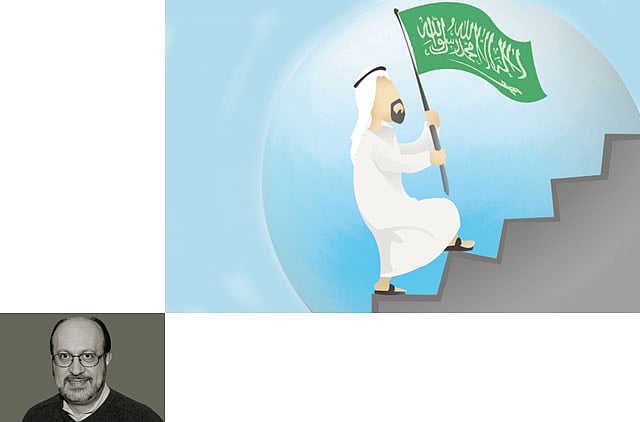First, it was the half-man description by Syrian President Bashar Al Assad of King Abdullah Bin Abdul Aziz in 2006 — though the Saudi forgave the youthful indiscretion. Regrettably, what followed was genuine anger after the Baath leader turned down the monarch's efforts to help resolve a popular uprising starting in 2011.
Abdullah was equally upset with Teh-ran as the latter reneged on successive pledges to maintain regional security and was disappointed with Washington for its lack of clarity in the aftermath of the epoch-making changes in Egypt, Yemen and elsewhere. Now comes a near-collapse of ties with Egypt over a mundane legal matter. Everyone wants Saudi financial support, but few welcome the monarch's advice.
Saudi Arabia recalled its ambassador from Cairo for security reasons after protesters threatened its diplomats in Egypt when news broke out that the kingdom had arrested an Egyptian human rights activist. On April 17, border police arrested Ahmad Al Gezawi soon after he arrived on a pilgrimage, allegedly for possessing more than 21,000 pills of the anxiety drug Xanax, which is banned in Saudi Arabia. Al Gezawi's supporters insisted that his arrest was due to a previous sentence, in absentia, because he was convicted to a year in prison and 20 lashes for insulting King Abdullah. No such convictions apparently existed, but why a routine judicial case was blown out of proportion and why it led to demonstrations at the Saudi embassy in Cairo remain mysteries.
The Saudi ruler's decision to withdraw the envoy was without a doubt a clear message to Field Marshal Mohammad Hussain Tantawi and other Egyptian leaders eager to gain power. If Cairo valued the kingdom and its unwavering support — with $2.7 billion (Dh9.93 billion) pledged just last week to back up the country's battered finances — it needed to make a small effort too. To be sure, Riyadh was upset when Hosni Mubarak was ousted, though it reluctantly accepted that change. Still, even if the way Mubarak was removed was less than satisfactory, it also perceived the meteoric rise of the Muslim Brotherhood with alarm. Not surprisingly, Saudi authorities were distressed by bizarre and mostly irreligious legal proposals in the Egyptian Parliament that further stigmatised Islam — with sickening details that involved necrophilia and under-age marriages — at a time when they forged overtures to other nations and held inter-faith dialogues to strengthen, not weaken, conditions for adherents.
When the regime in Syria responded with repression and destruction in what can only be described as brutal reactions to what were, at first, peaceful demands for reforms, Riyadh literally threw the gauntlet. It sided with the people against the regime and this was why Saudi Arabia could no longer reconcile with Bashar Al Assad.
Still, there was a future in intra-Arab relations and the many Egyptians and Syrians — among others — who worked in and benefited from Saudi Arabia, knew it better than most. Several million expatriate workers gained undeniable improvements in their standards of living as a direct result of such employment and, truth be told, both countries benefited from significant remittances to balance shaky budgets and improve overall economic conditions throughout the past few decades.
A recent Gallup Poll revealed millions wished to go permanently to Saudi Arabia, arguably to seize economic opportunities not available in their countries. Significantly, the kingdom ranked fifth after the US, UK, Canada and France as the preferred destination of aspiring emigrants.
Such positive indicators aside, King Abdullah was aware that Saudi authorities needed to put order at home as well as in the Gulf region to avoid the fate that befell their Levantine counterparts.
The octogenarian King Abdullah displayed patience with most, but was also determined to move ahead. His vision for Arabs and Muslims revolves around education and the creation of wealth. Not wacky modifications, destruction or death.
Dr Joseph A. Kechichian is the author of the forthcoming Legal and Political Reforms in Saudi Arabia (Routledge, 2012).
Sign up for the Daily Briefing
Get the latest news and updates straight to your inbox
Network Links
GN StoreDownload our app
© Al Nisr Publishing LLC 2026. All rights reserved.
